A VET has revealed the common household item that could KILL your cat – and the Christmas period could spell danger.
Veterinary surgeon Dr Catherine Henstridge, known on social media as 'Cat the Vet', compiled a list of items which should be out of your furry friend's reach as the festive season closes in.


Battery-powered gifts are popular during the Christmas period, particularly if you have kids.
But these can cause serious complications for your cat when ingested – and could be fatal.
"Unfortunately to our pets, especially our cats, they can look like fun, shiny toys to play with and have the potential to cause quite significant issues if they are swallowed, especially button batteries," Cat warned.
"Swallowing may result in a condition called current-induced necrosis, which can cause perforation of the mouth, oesophagus, stomach or small intestine.
read more in news
 CAM BACK
CAM BACK
Cameron admits sensational comeback is ‘unusual’ & says he’s ready to help Rishi
 BRAVER NEW WORLD
BRAVER NEW WORLD
Rishi hails ‘united’ Cabinet as Cameron’s return risks revolt from right
"So either buy with ‘batteries included’ or ensure the only batteries out, are the ones immediately placed into your new gift".
Commonly served foods on the big day can also be damaging to cats.
Sweet treats like chocolate "contain a chemical called theobromine which is toxic", while other food items like cheese, onion and garlic "can cause serious blood disorders".
Cat continued: "It isn’t just the sweet snacks that cause problems.
Most read in The Sun
 SU COMES OUT SWINGING
SU COMES OUT SWINGING
Suella accuses PM of ‘betraying nation’ in dossier after being sacked
 HOCKEY HORROR
HOCKEY HORROR
Man arrested over ‘manslaughter’ of ice hockey star Adam Johnson
 POT LUCK
POT LUCK
Gordon Ramsay’s rise from council estate to £610m that 6 kids ‘won’t see penny of’
 COLD CASE
COLD CASE
‘Woman with flower tattoo’ murder victim named after 31 years as missing Brit
"Any of the rich and fatty foods we enjoy can be problematic for our dogs and other pets, who are not going to be adverse to clearing a plate of cheese or stealing some Christmas ham.
These foods are far too calorific for them and will often cause vomiting and diarrhoea, which nobody needs to be clearing up the morning after the work Christmas do.
So make sure that these don’t make their way into your pet’s Christmas dinner bowl – sharing is caring but keep it to plain meat and veg."
Concerned owners should also be wary if their feline friend is eyeing up the Christmas tree in the living room.
Cat continued: Essentially what you have done is put a giant sparkly toy in your living room, with fun dangly things to play with and great climbing opportunities.
"Vets regularly see injuries from pets pulling trees down on top of them, swallowing decorations or smashing glass baubles and getting cuts.
"So try to only let your pets around the tree when you can supervise or make sure they don’t have easy access to it."
Some pets may also try and nibble on the tree's decorations, which could again be fatal if they get caught in their throat.
"They love to play with things like tinsel but if they accidentally swallow it, it can cause really serious blockages in throats and digestive system."
Experts are urging pet owners to consider investing in Pet Insurance before festive sweet and savoury snacks are left out to pick at.
Saarrah Mussa, pet insurance expert at MoneySuperMarket, said: “Our research shows that some dog owners are opting out of insurance because of the cost.
"But as we have seen from our survey, accidents happen, especially at Christmas when a mince pie, or box of chocolates could prove too tempting for your pet.
"Vet bills can quickly add up so if the worst happens, it’s better to be covered.
“Nearly all insurance policies have a two-week cooling off period and in that time insurers will not honour any claims.
"That means if you’re thinking about getting cover for Christmas, you’re better off sorting it now before the house fills up with festive treats."
It comes after Cat lifted the lid on the five things you should never do with your dog – but her advice is dividing opinion.
The pets whizz said dog owners should never rely on homoeopathy treatment or 'all-natural' remedies for their dogs.


Source: Read Full Article


